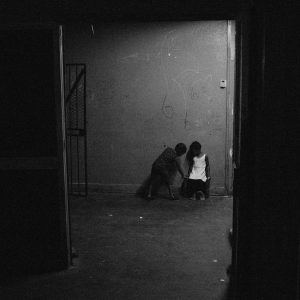Book Review | An Eternal Audience of One
Set primarily in Windhoek, Rémy Ngamije’s debut novel is a story of family, friendship and migration. Across six countries, it questions the idea and experience of home.
Author:
30 June 2020

The Eternal Audience of One by Rémy Ngamije is a transportive novel. In an epic spanning just over 500 pages and six countries, the Rwandan-born Namibian author takes readers on a narrative journey in a story about family, friendship and migration.
On the eve of President Cyril Ramaphosa’s declaration of the national lockdown in response to Covid-19, Ngamije went live on Facebook in the kitchen of his Windhoek home to launch the book. The Time of the Writer festival, which had been scheduled to start on 16 March at the Ekhaya Multi-Arts Centre in KwaMashu, Durban, took place online instead.
One of Ngamije’s concluding remarks during the launch encapsulated the lifeblood of the novel: “I’ve always gravitated towards stories of how people experience elsewhere.”
Related article:
The Eternal Audience of One is an important contribution to the African canon of migrant literature because the narrative upends one of its most prevalent tropes. The story doesn’t revolve around a main character who migrates to Europe or the United States; instead, it destabilises that common narrative by focusing on an African that migrates from East Africa to southern Africa.
For Ngamije, the experience and concept of migration is far more expansive than the narrow passage from the Global South to the Global North. In his view, migration is something that happens every time you pack your bags and leave behind anything or anywhere that you refer to as home: neighbourhoods, cities, countries – even mindsets or socioeconomic classes.
Escaping and finding home
Delving into the idea of home, adaptation and the challenges of “newness”, The Eternal Audience of One explores how the novel’s main character, Seraphin, moves from Kigali to Nairobi then Windhoek to Cape Town and back to Windhoek again.
Readers bear witness to how Seraphin and his family escape the brutality of the Rwandan genocide to settle for a short while in Kenya before finally attempting to make a new home for themselves in Namibia. We are spectators as Seraphin barrels through his university days in South Africa. Nestled in between Seraphin’s experiences, we get glimpses of his parents’ journey through their studies and eventual love story in Brussels and Paris.
While much of the action happens in places other than Windhoek, particularly Cape Town, the Namibian capital is the book’s primary setting. During the launch, Ngamije expressed how he had concerns about setting a huge chunk of his narrative in a city he described as having its own particular idiosyncrasies that require navigation, circumvention or, at best, attempts at appreciation. He wondered if audiences would find it a bit too “out there” to read a story set in Windhoek, yet he found comfort in the novelty of writing about a place that isn’t explored enough in literature.
Related article:
In the novel, Seraphin calls Windhoek “a capital village”. In his beautifully snarky and irreverent voice, the prologue unpacks everything from Windhoek’s weather patterns (“hot, mosquito and fucking cold”) to its socioeconomic inequalities (“If you’re not politically connected or come from old white money, then the best thing is to be a tourist”). Seraphin concludes that the “city is called a city because the country needs one, but really, city is a big word for such a small place”.
During the launch, Ngamije explained that though Windhoek has the bare bones and inner workings of a city, it fails to be the major metropolis we expect of capital cities. He’s honest about the struggle, especially for Namibia’s youth, to love Windhoek or to find a genuine sense of fulfilment in a place that can feel too small, stuffy, monotone and insular.
Windhoek in other places
Nonetheless, Ngamije also acknowledged how easy it is to find pieces of Windhoek in other places. He highlighted Teju Cole’s Every Day Is for the Thief among the African books he’d recently read. In Cole’s novel, Ngamije discovered a Lagos that shares similarities with his Windhoek. This discovery resonated with something he deeply enjoys about being a writer: being able to tell stories in which readers can see themselves and their experiences.
Seraphin’s Windhoek and Cape Town resonate with the reader. Ngamije’s main character experiences a boredom with where he grew up that feels intensely familiar as he struggles with a place that doesn’t sound, look or feel like him, a place that feels choking in its suburban mediocrity and middle-of-the-roadness.
Related article:
Seraphin’s retelling of moving to Cape Town to attend university also feels intensely close. It’s the story of moving to a city that forms and schools you in adulthood in the best and worst ways. The narrative is filled with exuberant and libido-fuelled antics, that jovial sense of being a privileged student in the city. Yet it does this without ignoring the racism, xenophobia and toxic class dynamics that take up residence on the streets, in the taxis, in the homes and on the dance floors of this tourist trap that some of us have called home.
Ngamije credited Zadie Smith’s On Beauty and Marlon James’ A Brief History of Seven Killings as books that paved the way for the structure, flow and voice of his book. He appreciated Smith’s humour and her unwitting reassurance that there is space for the narrative world he wanted to construct. James’ work encouraged him to be courageous with the structure and voice of the book, to not be too conscious of what has gone before and to break from the rigidity of what a novel should be.
Textual solidarity
Answering a question about the messages he’s trying to communicate through this book, Ngamije was clear that his novel is not an instruction manual on how to live your life, but rather a kind of textual solidarity. He wants readers to make up their own minds about what their message from the story is, yet he hopes they are able to see the connection between their lives and those of others.
Thinking about home, Ngamije was clear that sometimes home isn’t what it’s meant to be. Sometimes the place where we hope to be embraced for who we are is exactly where we are rejected and excluded. He put this into the context of Covid-19’s push to “stay home” and explained that sometimes home can be a traumatic place, or sometimes you simply don’t have one.
Ngamije spoke about how material acquisition distorts your view of life on the continent and of those who share your borders, joining the many voices during this pandemic that are poking through the numbness and denialism about inequality globally and on the continent.
Related article:
An Eternal Audience of One explores inequality, class and socioeconomic circumstances, calling those who fall inside comfortable class brackets “have-Africans” – a riff on the “haves” and the “have-nots”, a distinction that is particularly fitting in the era of Covid-19.
“Life is not hard in Windhoek, but it isn’t easy either. The poor are either falling behind or falling pregnant. The rich refuse to send the elevator back down when they reach the top. And since cities require a sturdy foundation of tolerated inequalities, Windhoek is like many other big places in the world. It is a haven for more but a place of less.”
And: “Alarm bells ring as children and parents prepare for school; the blue collars make their way to a bus or truck stop and wait to be carried towards places of cheap labour and the white collars take their time getting to desks and offices.”
Beyond borders
The Eternal Audience of One is an honest, funny and often searing interrogation of home. Both the ordinary or light-hearted everyday exchanges in Seraphin’s family and the grit-your-teeth encounters feel like a mirror. The novel traverses many borders, both in its narrative content and scope, and this story will continue to skip across national and regional barriers.
Ngamije was recently short-listed for the Caine Prize for African Writing for his short story The Neighbourhood Watch, which was published in the Johannesburg Review of Books in 2019. In addition, on 18 June, the book’s South African publisher, Blackbird Books, announced that the English rights had been sold to Scout Press, an imprint from Simon & Schuster in the US.
Ngamije responded to the news of his international publishing deal by penning a letter of gratitude on his website, Windhoek to the World, which included these words of affirmation directed at his publisher: “Blackbird Books – the independent, black-owned and female-led South African publisher who published a book that was “too long” and “too foreign” – will retain the rights to publish the book in SADC [Southern African Development Community]. This means a lot to me: home will always be the best place to win.”




